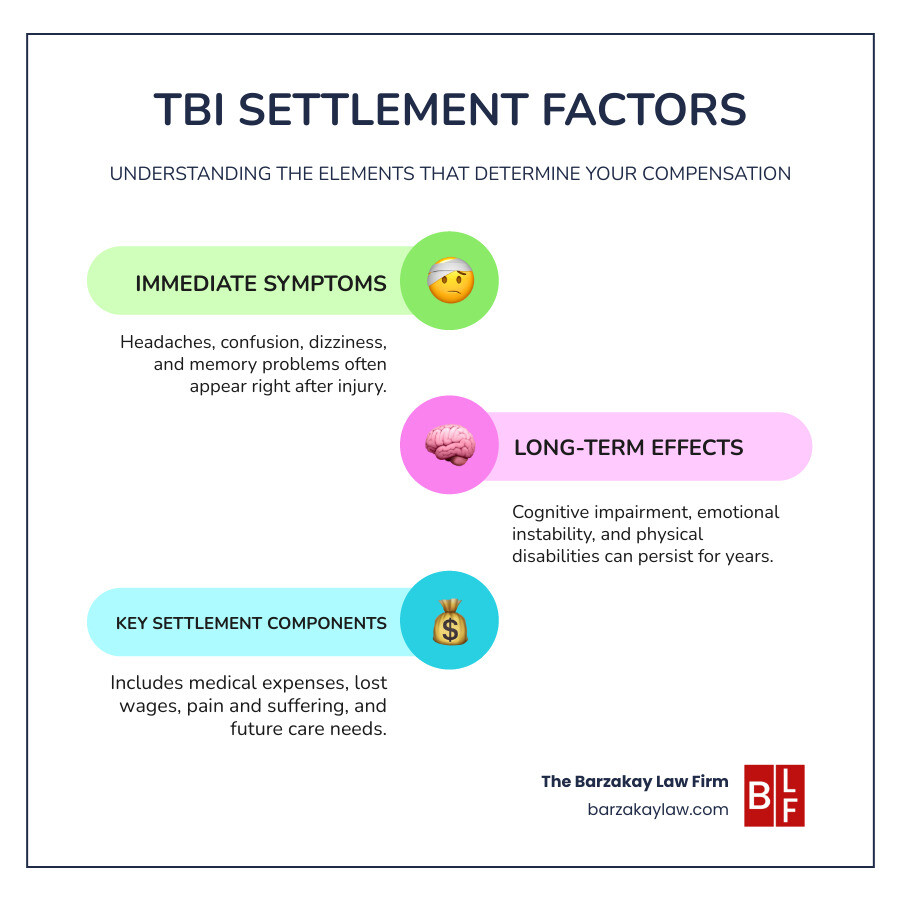Understanding Your Rights to Fair Compensation After a Brain Injury
TBI injury settlements provide financial recovery for victims and their families facing the consequences of traumatic brain injuries. If you or a loved one has suffered a brain injury due to someone else’s negligence, understanding the settlement process is the first step toward securing the compensation you deserve.
Quick Overview: TBI Injury Settlements
- Settlement Ranges: Mild TBIs may settle for $50,000-$150,000, moderate cases for $500,000-$1 million, and severe cases often exceed $1 million.
- Key Factors: Settlement value depends on injury severity, medical costs, lost income, pain and suffering, and insurance limits.
- Timeline: Cases can take months to several years to resolve.
- Recoverable Damages: Economic losses (medical bills, lost wages) and non-economic damages (pain, suffering, loss of quality of life).
Traumatic brain injuries are life-changing, leading to memory loss, cognitive impairments, and physical disabilities. Survivors often face years of rehabilitation and significant financial strain.
For families in South Florida communities like Hollywood, Miami, and Boca Raton, securing fair financial compensation is a vital part of recovery. Insurance companies often try to minimize payouts, making it important to understand what your claim is truly worth.
This guide explains TBI settlements—from understanding brain injuries to calculating damages and working with legal counsel to maximize your recovery.
Understanding Traumatic Brain Injury (TBI) and Its Impact
A traumatic brain injury (TBI) occurs when an external force, like a violent bump or jolt, damages the brain. Most TBIs happen because of someone else’s negligence, which is a key factor in tbi injury settlements. In South Florida communities like Hollywood, Miami, and Boca Raton, common causes include car accidents, slip and fall accidents, and violent acts.
Even a “mild” TBI can alter someone’s life, affecting their ability to work, maintain relationships, and enjoy daily activities. You can learn more about the long-term effects of TBI and how they impact recovery.
Types and Severities of TBI
Understanding TBI severity is essential for determining the value of a settlement. Injuries are classified into three main categories.
- Mild TBI: Commonly known as a concussion, it may involve a brief loss of consciousness, confusion, headaches, and memory issues. While many recover quickly, some develop post-concussion syndrome with lingering symptoms. More on concussions can provide additional information.
- Moderate TBI: This involves a longer loss of consciousness, and symptoms like memory problems and emotional issues may persist for months or become permanent.
- Severe TBI: This is the most catastrophic level, often leading to a coma, permanent brain damage, and significant physical and cognitive impairments. These injuries require lifelong care and can reduce life expectancy.
Medical providers use the Glasgow Coma Scale to assess severity, which directly impacts the long-term prognosis and settlement value. For severe injuries, our Catastrophic Brain Injury Lawyer resources offer further guidance.
Common Symptoms and Long-Term Effects
TBI symptoms can appear immediately or emerge weeks later, affecting all aspects of life.
- Cognitive Impairments: Victims often struggle with memory loss, difficulty concentrating, and slowed thinking.
- Emotional Instability: Mood swings, anxiety, depression, and personality changes are common and can strain relationships.
- Physical Disabilities: These include persistent headaches, dizziness, chronic fatigue, seizures, and problems with coordination and movement.
Rehabilitation for TBIs involves various therapies to help regain independence. These long-term effects are a critical component in calculating damages for tbi injury settlements.
What Damages Can Be Recovered in TBI Injury Settlements?
If someone’s negligence caused your TBI, you deserve compensation for your losses. These compensatory damages fall into two main categories: economic (financial costs) and non-economic (personal suffering), as explained by the legal definition of compensatory damages. TBI injury settlements are designed to cover the full burden of the injury, shifting the financial responsibility to the at-fault party.
Calculating Economic Damages
Economic damages are the tangible costs proven with receipts, bills, and pay stubs. For TBI claims, these can include:
- Medical Expenses: All costs from emergency treatment to future medical care, including hospital stays, surgeries, rehabilitation, and medication. Lifetime costs for a severe TBI can be substantial.
- Lost Wages: Income you missed while recovering from the injury.
- Diminished Earning Capacity: The loss of future income if you cannot return to your previous career or work at the same level. This is analyzed by vocational professionals who consider your age, education, and work history.
- Other Costs: This includes rehabilitation therapies, home modifications like wheelchair ramps, and property damage from the accident.
Calculating Non-Economic Damages (Pain and Suffering)
These damages compensate for the personal, non-quantifiable toll of your injury. They often represent a large portion of a settlement.
- Pain and Suffering: Includes both physical pain and the emotional weight of living with a TBI, such as constant headaches or the frustration of memory loss.
- Emotional Distress: The psychological impact, including anxiety, depression, and grief.
- Loss of Enjoyment of Life: Compensation for the inability to participate in hobbies and activities that once brought you joy.
- Loss of Consortium: A claim made by a spouse or family member for the damage to your relationship. See the legal definition of loss of consortium.
Attorneys often use a multiplier method (multiplying economic damages by a factor based on severity) or a per diem method (a daily dollar amount) to calculate these damages.
Can Punitive Damages Be Awarded?
In rare cases, Florida law allows for punitive damages to punish the wrongdoer for gross negligence or intentional misconduct. A common example is a drunk driving accident. While not applicable to most TBI cases, they can significantly increase a settlement’s value. Our team at Attorney Head Injury can identify if punitive damages may be appropriate for your case. A fair tbi injury settlement should account for all past, present, and future costs associated with your injury.
Key Factors That Determine Your TBI Settlement Value
No two tbi injury settlement amounts are the same; they are calculated based on the unique circumstances of your case. Insurance adjusters and legal teams weigh multiple factors to arrive at a number. Understanding these elements can help you set realistic expectations.
How Injury Severity Influences TBI Injury Settlements
The severity of the brain injury is the most significant factor. In our work with clients in Hollywood, Miami, and Boca Raton, we see a direct correlation between injury severity and settlement amounts.
- Mild TBIs (Concussions): Settlements typically range from $50,000 to $150,000, but can be higher if complications like post-concussion syndrome arise. For example, we secured a $329,000 settlement for a client with a “mild” concussion that caused persistent issues.
- Moderate TBIs: These cases often settle for $500,000 to $1 million, reflecting a prolonged recovery and potential for moderate permanent impairment.
- Severe TBIs: When an injury causes profound cognitive impairment or permanent disability, settlements frequently exceed $1 million and can reach $10 million or more. We have handled cases resulting in settlements of $4.9 million and $16 million for victims with severe, life-altering TBIs.
Substantiating injury severity requires solid medical evidence, including medical records, diagnostic imaging (MRI, CT scans), and neuropsychological testing. Our Brain Injury Lawyer team knows how to gather and present this evidence effectively.
The Role of Liability, Negligence, and Insurance Limits
To receive compensation, we must clearly establish who was at fault. This involves gathering evidence like police reports and eyewitness testimony to prove negligence.
Florida’s comparative negligence rule means your compensation is reduced by your percentage of fault. If your damages are $1 million and you are 20% at fault, you would receive $800,000. Insurance companies often try to inflate your share of the blame to reduce their payout.
Additionally, the at-fault party’s insurance policy limits can cap your recovery. If damages are $2 million but the policy limit is $500,000, that is the maximum the policy will pay. We investigate all sources of compensation, including your own uninsured/underinsured motorist (UI/UIM) coverage, to maximize recovery.
How Personal Factors Affect TBI Injury Settlements
Personal factors unique to each victim also influence case value.
- Age and Life Expectancy: A younger victim with a severe TBI faces a longer period of disability and accumulating costs, often resulting in a higher settlement.
- Occupation and Career Trajectory: A high-earning professional who can no longer work in their field will have a larger claim for lost earning capacity than someone in a less-specialized role.
- Pre-existing Conditions: Insurance companies may argue your symptoms are from a pre-existing condition. We work to show how the TBI caused new symptoms or worsened an existing one.
- Impact on Quality of Life: The loss of ability to enjoy hobbies, maintain relationships, and participate in daily activities is a real and compensable loss.
Our TBI Attorney team documents these personal factors to ensure your settlement reflects your individual story.
Navigating the TBI Settlement Process in Florida
If you’re dealing with a TBI in South Florida—whether in Hollywood, Miami, Boca Raton, or Fort Lauderdale—the legal process can feel overwhelming. Understanding how settlements work in Florida is vital to protecting your rights and securing the compensation you need.
Statute of Limitations for Filing a TBI Claim
In Florida, you have a limited time to file a personal injury lawsuit. For most TBI claims, the statute of limitations is generally two years from the date of the accident. Missing this deadline can mean losing your right to seek compensation entirely. It is important to act promptly, as evidence can fade and witnesses’ memories can dim over time.
Crucial Evidence for a Strong Claim
A strong TBI claim is built on comprehensive evidence. Key pieces include:
- Medical Records: This is the cornerstone, including ER visits, consultations with neurologists, diagnostic scans (CT, MRI), and records of all therapies.
- Testimony from Professionals: Neurologists can explain the medical complexities of your TBI. Vocational analysts can assess its impact on your ability to work, and life care planners can project future medical costs.
- Proof of Lost Income: Pay stubs, tax returns, and employment records document your financial losses.
- Accident Evidence: Witness statements, photos, and videos from the scene help establish liability.
- Personal Journal: Documenting your daily symptoms, pain levels, and emotional struggles provides a detailed record of your suffering and its impact on your quality of life.
Why You Shouldn’t Accept the First Settlement Offer
Insurance companies are businesses focused on minimizing payouts. They often make a lowball offer early on, hoping you’ll settle for less than your case is worth. Accepting this offer is usually a mistake.
The full extent of a TBI may not be clear for months or even years. Settling too early means you can’t seek more money if new complications arise. We recommend waiting until you reach Maximum Medical Improvement (MMI)—the point where your condition has stabilized. This allows us to accurately assess your long-term needs and ensure they are covered in the settlement.
The Importance of a Knowledgeable TBI Attorney
Working with an attorney who understands TBI cases and Florida law can make a significant difference. At The Barzakay Law Firm, we conduct a thorough case investigation, calculate your full damages by collaborating with medical and financial professionals, and handle all negotiations with insurance companies.
We prepare every case for trial, which strengthens our negotiating position. We also work on a contingency fee basis, meaning you pay no upfront fees, and we only get paid if we win your case. Our Hollywood Traumatic Brain Injury Lawyer team is here to help. You can also find more information on our Brain Injury Lawyer Near Me page.
Frequently Asked Questions about TBI Settlements
When dealing with a traumatic brain injury, you likely have many questions about tbi injury settlements. Here are answers to some common questions we hear from families in South Florida.
How long does it typically take to reach a TBI settlement?
There is no simple answer, as every case has its own timeline. A settlement can take months or even a few years. Key factors influencing the timeline include case complexity, the time it takes to reach Maximum Medical Improvement (MMI), and the negotiation period with insurance companies. If a lawsuit is filed, the litigation timeline can add more time. The goal is not to rush, but to secure a fair resolution.
What is diminished earning capacity and how is it calculated?
Diminished earning capacity refers to the future income you will lose because your TBI prevents you from working at your previous capacity. It’s the difference between what you would have earned and what you can now earn with your limitations.
This is calculated through vocational analysis, where professionals review your skills, education, work history, and earning potential before the injury. They then assess your current capabilities and what jobs you can realistically perform. Your age and career trajectory are significant factors; a younger person with a derailed career path will have a more substantial claim.
What is the average settlement for a mild TBI?
While every case is unique, settlements for mild TBIs like concussions typically range from $50,000 to $150,000. However, this can be higher, especially if you suffer from post-concussion syndrome with lingering symptoms like persistent headaches, dizziness, or memory problems.
For example, we secured a $329,000 settlement for a client whose “mild” concussion led to ongoing issues that disrupted their life. The word “mild” can be misleading, as the impact on your life may be significant. Thorough documentation of your symptoms and their effect on your daily activities is key to proving the true value of your claim, especially since insurance companies often try to downplay concussions.
Securing Your Future After a TBI
A traumatic brain injury affects the injured person and their entire family, creating physical, emotional, and financial burdens. While no settlement can undo the injury, a fair tbi injury settlement can provide the financial resources needed to move forward. It provides access to quality medical care and rehabilitation, offering stability so you can focus on healing.
Maximizing Your Settlement
Securing full compensation requires a strategic approach. It involves documenting every medical appointment and symptom, and working with medical and financial analysts to calculate all past, present, and future losses. A settlement must account for obvious costs like hospital bills and less visible ones like a lost career or diminished quality of life. It also means having an advocate who understands how insurance companies operate and will protect you from being taken advantage of.
Why Choose The Barzakay Law Firm
At The Barzakay Law Firm, we understand the personal challenges TBI survivors and their families face throughout South Florida, including in Hollywood, Miami, and Boca Raton. We know every case is unique, and your settlement should reflect that.
We work on a contingency fee basis, so you pay nothing upfront. We only get paid if we win your case, which means we are fully invested in a favorable outcome for you. While you focus on recovery, we handle the legal complexities, from investigating your case to negotiating with insurance companies.
You Don’t Have to Face This Alone
If you or a loved one suffered a TBI due to someone else’s negligence, you don’t have to steer this journey alone. You deserve compensation that reflects the true impact on your life. Let us help you secure the financial future you need to move forward.




